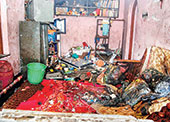 |
| The room in which Chaitali Santra opened the parcel bomb that killed her on Wednesday afternoon. Picture by Gopal Senapati |
The next time a parcel you weren’t expecting arrives by courier, you would be better off not accepting, let alone opening it, without confirming who the sender is.
Most courier companies in town don’t have any mechanism to make sure that the parcels they ship and deliver don’t contain illegal material, including improvised explosive devices like the one that killed freelance crime reporter Chaitali Santra in her Howrah home on Wednesday.
“Many small and medium-sized courier companies scattered across the city don’t even have proper office space, forget safety mechanisms. And this is a business where a difference in margin by Rs 1-2 can cost you a client,” Sandeep Karan, head of a FedEx franchise on Park Street, told Metro.
Chaitali, 40, was opening the parcel she had just received sitting on her bed when an explosion flung her several feet. She crashed into a wall and died. Husband Himangshu suffered 80 per cent burns.
Police have yet to find out where the parcel came from and who delivered it, but the assumption is that the victim had opened it without being sure about the sender.
According to a conservative estimate, courier firms in the city handle a little over 100 tonnes of consignments every month, the bulk of them parcels. No courier firm has an X-ray machine installed to run a quick scan before accepting each parcel.
Courier companies are not supposed to accept consignments unless they are sure about what the contents are. If there is any doubt, the consignor can be asked to open the parcel for a check before the invoice is written with details of the contents.
All parcels are to be sent to the despatch hub of the company, where bulk and individual scanning is done, depending on the nature of the consignment mentioned in the invoice.
“If there is any mismatch, the agent concerned is held responsible,” said the owner of a courier franchise in BBD Bag. “But there are many small operators who don’t believe in following this standard operating procedure.”
Not just small operators, agents of even the established big names in the business don’t verify the contents of parcels before accepting them. For commercial and official consignments, the only thing that seems to matter is a declaration (challan in courier parlance) under a letterhead. Items bought online are shipped in much the same manner, though some of the bigger companies such as Flipkart have their own delivery network for some consignments or rely on the established names.
“Any such document can be faked and there is no way the courier company can detect it at the time of booking. We have regular customers with whom we operate on faith. Otherwise, we can’t survive in this business,” said an agent of a courier company that ships within Bengal.
When a bomb slips through this porous safety net of trust and little else, a life could be lost like that of schoolteacher Aparna Biswas in Malda last year or of crime reporter Chaitali in Howrah’s Shibpur on Wednesday afternoon.
Aparna died on April 24 last year after a parcel she thought contained books blew up while she was trying to open it.
The ease with which a parcel bomb can be couriered to a target without being detected is scary. While the police and courier firms have left it to the consignee to check whether a parcel is safe, how does one make sure the sender hasn’t faked an identity?
“I often receive books sent by my son from New Jersey. The man who comes to deliver the parcels has become a familiar face. If he hands over a packet containing something other than what I am expecting someday, how would I know?” demanded 62-year-old Madhumita Pyne of Behala.











